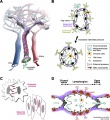File:Lymphatic vasculature 01.jpg: Difference between revisions
| (7 intermediate revisions by the same user not shown) | |||
| Line 1: | Line 1: | ||
==Lymphatic Vasculature Organization cartoon== | ==Lymphatic Vasculature Organization cartoon== | ||
* '''A''' - The lymphatic vasculature resorbs fluid, macromolecules, and cells from the interstitium. | * '''A''' - [[:File:Lymphatic_vasculature_04.jpg|The lymphatic vasculature]] resorbs fluid, macromolecules, and cells from the interstitium. | ||
* '''B''' - Mechanism of lymph formation in capillaries. Interstitial components penetrate lymphatic capillaries via openings between lymphatic endothelial cells (LECs). The specialized structure of such openings prevents the return of lymph back to the interstitium. Anchoring filaments attach LECs to the ECM and prevent vessel collapse under conditions of increased interstitial pressure (black arrow). | |||
* '''B''' - Mechanism of lymph formation in capillaries. Interstitial components penetrate lymphatic capillaries via openings between lymphatic endothelial cells (LECs). The specialized structure of such openings prevents the return of lymph back to the interstitium. Anchoring filaments attach LECs to the extracellular matrix (ECM) and prevent vessel collapse under conditions of increased interstitial pressure (black arrow). | |||
* '''C''' - Junctional organization of LECs in lymphatic capillaries and collecting vessels. Both “buttons” and “zippers” share a repertoire of adherens and tight junction–associated proteins (e.g., VE-cadherin, zonula occludens-1, occludin, and claudin-5). The main difference between them resides in their organization (Baluk et al., 2007). | * '''C''' - Junctional organization of LECs in lymphatic capillaries and collecting vessels. Both “buttons” and “zippers” share a repertoire of adherens and tight junction–associated proteins (e.g., VE-cadherin, zonula occludens-1, occludin, and claudin-5). The main difference between them resides in their organization (Baluk et al., 2007). | ||
* '''D''' - Mechanism of lymph propulsion in collecting vessels. Coordinated opening and closure of lymphatic valves is important for efficient lymph transport. SMCs covering each lymphangion possess intrinsic contractile activity. EC, endothelial cell. | |||
* '''D''' - [[:File:Lymphatic_vasculature_03.jpg|Mechanism of lymph propulsion in collecting vessels]]. Coordinated opening and closure of lymphatic valves is important for efficient lymph transport. Smooth muscle cells (SMCs) covering each lymphangion possess intrinsic contractile activity. EC, endothelial cell. '''lymphangion''' - is the functional unit of a lymph vessel that lies between two semilunar (half moon-shaped) valves. | |||
{{Lymphatic vasculature links}} | |||
===Reference=== | ===Reference=== | ||
| Line 14: | Line 20: | ||
© 2011 Schulte-Merker et al. | © 2011 Schulte-Merker et al. | ||
Above text modified from figure 1 legend. | |||
The Rockefeller University Press, doi: 10.1083/jcb.201012094 | The Rockefeller University Press, doi: 10.1083/jcb.201012094 | ||
[[Category:Immune]] [[Category:Cartoon]] | |||
Latest revision as of 14:18, 14 February 2013
Lymphatic Vasculature Organization cartoon
- A - The lymphatic vasculature resorbs fluid, macromolecules, and cells from the interstitium.
- B - Mechanism of lymph formation in capillaries. Interstitial components penetrate lymphatic capillaries via openings between lymphatic endothelial cells (LECs). The specialized structure of such openings prevents the return of lymph back to the interstitium. Anchoring filaments attach LECs to the extracellular matrix (ECM) and prevent vessel collapse under conditions of increased interstitial pressure (black arrow).
- C - Junctional organization of LECs in lymphatic capillaries and collecting vessels. Both “buttons” and “zippers” share a repertoire of adherens and tight junction–associated proteins (e.g., VE-cadherin, zonula occludens-1, occludin, and claudin-5). The main difference between them resides in their organization (Baluk et al., 2007).
- D - Mechanism of lymph propulsion in collecting vessels. Coordinated opening and closure of lymphatic valves is important for efficient lymph transport. Smooth muscle cells (SMCs) covering each lymphangion possess intrinsic contractile activity. EC, endothelial cell. lymphangion - is the functional unit of a lymph vessel that lies between two semilunar (half moon-shaped) valves.
- Links: Structure Cartoon | Development Cartoon | Lymphangion Cartoon | Vasculature cartoon | Lymphatic Development | Immune Development
Reference
<pubmed>21576390</pubmed>| PMC3166860 | J Cell Biol.
Copyright
Rockefeller University Press - Copyright Policy This article is distributed under the terms of an Attribution–Noncommercial–Share Alike–No Mirror Sites license for the first six months after the publication date (see http://www.jcb.org/misc/terms.shtml). After six months it is available under a Creative Commons License (Attribution–Noncommercial–Share Alike 4.0 Unported license, as described at https://creativecommons.org/licenses/by-nc-sa/4.0/ ). (More? Help:Copyright Tutorial)
© 2011 Schulte-Merker et al.
Above text modified from figure 1 legend.
The Rockefeller University Press, doi: 10.1083/jcb.201012094
File history
Click on a date/time to view the file as it appeared at that time.
| Date/Time | Thumbnail | Dimensions | User | Comment | |
|---|---|---|---|---|---|
| current | 14:41, 12 February 2013 |  | 1,177 × 1,280 (249 KB) | Z8600021 (talk | contribs) | ==Organization of lymphatic vasculature== (A) The lymphatic vasculature resorbs fluid, macromolecules, and cells from the interstitium. (B) Mechanism of lymph formation in capillaries. Interstitial components penetrate lymphatic capillaries via openings |
You cannot overwrite this file.
File usage
The following page uses this file: